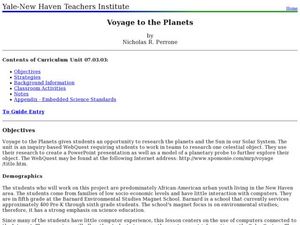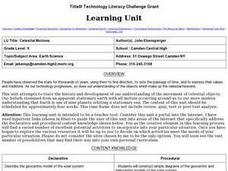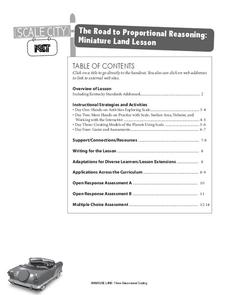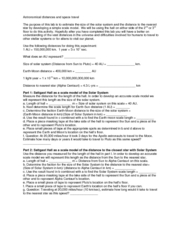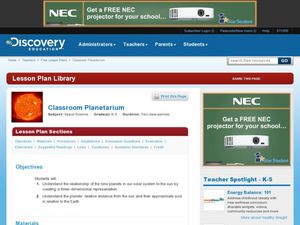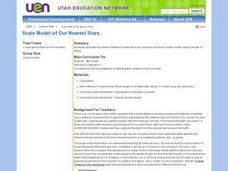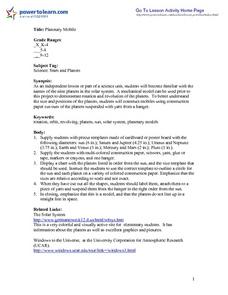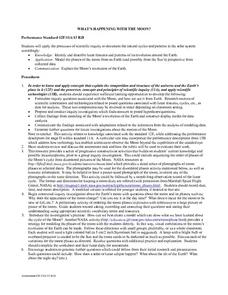Curated OER
Voyage to the Planets
Learners examine the planets in the solar system. In this planetatry lesson students complete a project using a WebQuest program.
Curated OER
Space Exploration
Young scholars explore different planets of our solar system. Students gather specific information on each of the planets. Young scholars choose suitable planet for colonization.
Curated OER
Working on the Moon
Students take a mission to the moon. In this space science lesson, students visit selected websites to discover information about Earth's moon and the solar system. Students may take virtual missions to the moon and share...
Curated OER
Attributes of Renewable Energy: From Nanopossibilities to Solar Power
High schoolers explore solar energy, why we use it and how we use it. In this renewable energy lesson students compare active and solar techniques.
Curated OER
Demonstrating the Distances of Stars
Learners examine the distance from Earth to stars. They create a model to show the arrangement of constellations. They also identify the importance of the parallax effect.
Curated OER
Strange New Planet
Students simulate different spacecraft missions using materials provided. In this space science lesson, students observe and record a planetary model's features from a distance. They relate this activity to scientists' space exploration...
Curated OER
Celestial Motions
Ninth graders complete a unit of lessons on the history of our knowledge of celestial objects. They conduct Internet research, plot the motion of a planet, construct a model of the sun's apparent motions, and create diagrams of the solar...
PBS
Why Isn't There an Eclipse Every Month?
Searching for an eclipse activity that sends scholars over the moon? Try an interesting interactive to get their minds active! The resource, part of an extensive Space series from PBS Learning Media, uses modeling and data analysis to...
Kentucky Educational Television
The Road to Proportional Reasoning
Just how big would it really be? Young mathematicians determine if different toys are proportional and if their scale is accurate. They solve problems relating scale along with volume and surface area using manipulatives. The...
Curated OER
NASA's Mars gamble pays off
Students read an article about NASA and Mars and complete short answer questions about the article. For this Mars lesson plan, students also create a scale model of the solar system.
Curated OER
Toilet Paper Solar System
Students create a model of the distances of the planets in the solar system using sheets of toilet paper and markers. Generally accepted orbital parameters are applied.
Curated OER
Astronomical Distances and Space Travel
Students estimate the size of the solar system and the distance to the nearest star. In this space lesson students complete calculations and use Sattgast Hall as a scale model.
Curated OER
A Model of the Sun's interior
Students create a three-dimensional model of the sun. In this solar system instructional activity, students design a scale model of the sun using plasticine.
Curated OER
Classroom Planetarium
Students work in groups to create the planets of the solar system. In this planets activity, students create a hanging solar system taking into account the size, shape and position of the planets. Students discuss the gravity...
NASA
Photons in the Radiative Zone: Which Way Is Out? An A-Maz-ing Model
Can you move like a photon? Young scholars use a maze to reproduce the straight line motion of a photon. The second in a six-part series of lessons on the sun has learners measure angle of incidence and refraction to determine the path...
University of Colorado
The Jovian System: A Scale Model
Jupiter has 67 moons! As the seventh in a series of 22, the exercise shows learners the size and scale of Jupiter and its Galilean moons through a model. They then arrange the model to show how probes orbited and gathered data.
Space Awareness
Living in the Milky Way
Get to know our galaxy with an astronomy-themed, hands-on activity. Scholars watch an informative video, answer questions, and construct a model of the Milky Way in order to examine its contents and the distance inside it.
Space Awareness
Meet Our Neighbors: Sun
The sun isn't just a ball of yellow! Young scientists learn about the features of the sun using a hands-on modeling activity. They build models of the sun using common household items to represent sunspots, solar prominence, and the...
Curated OER
Energy Solutions; A Brochure
By creating an energy brochure, teams of science learners inform others about the advantages of using alternative energy sources. An instructions page for your class and a grading rubric are provided. The lesson plan focuses on...
Teach Engineering
Energy Resources and Systems
We've talked a lot about energy, but where does energy come from? Pupils brainstorm different energy sources through a class discussion to kick off the 14th installment of a 25-part Energy Systems and Solutions unit. They then research...
Curated OER
Make a Comet Model and Eat It!
Students construct a comet model based on procedure provided. In this space science instructional activity, students compare the physical properties of comets to the models they made. They record their observations and share them with...
Curated OER
Scale Model of Our Nearest Stars
Sixth graders calculate a light day, light hour, and light minute from the standard of a light year. After establishing the distances, a one meter scale is created to demonstrate the distance between the sun and the planets of our solar...
Curated OER
Planetary Mobile
Students receive pre-cut templates of cardboard with appropriate diameters of each planet and the sun. They use multi-colored construction paper, scissors, yarn, and other art supplies to create their own models of planets. When students...
Curated OER
What's Happening With the Moon?
Young scholars review the process of scientific inquiry. Using this information, they identify the patterns and cycles of the moon as it revolves around the Earth. In groups, they model the phases of the moon from the Earth and Sun's...
Other popular searches
- Rubric Solar System Model
- Space Solar System Model
- Solar System Model Projects
- The Solar System Model
- Scale Models Solar System
- Build Solar System Model
- Solar System Model Lessons
- Building Solar System Model
- Model of Solar System
- Scale Model of Solar System
- Making Models of Solar System
- Model of the Solar System


